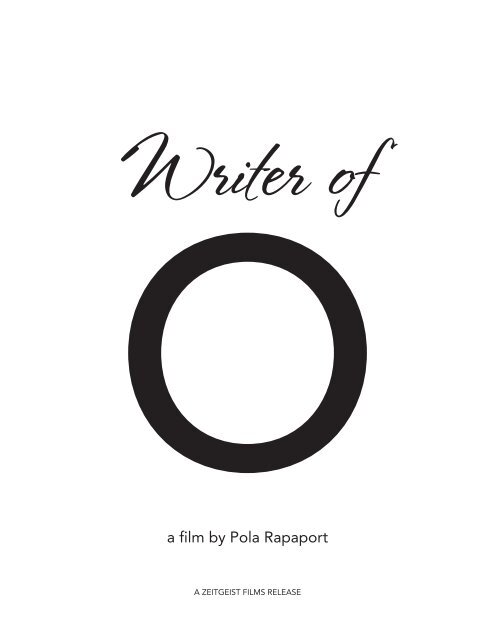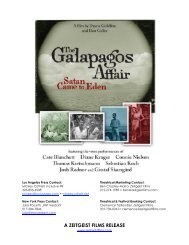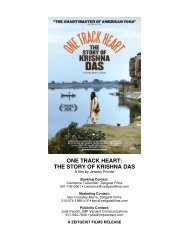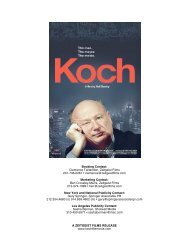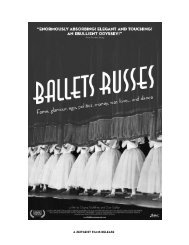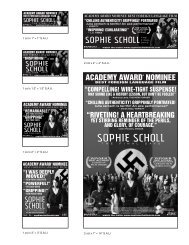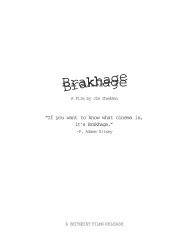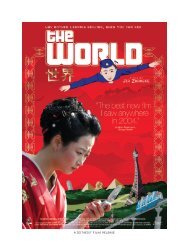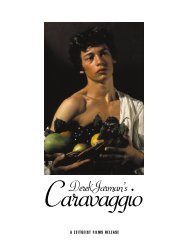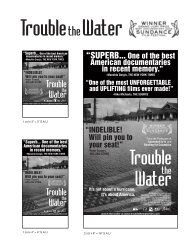Oa film by Pola Rapaport - Zeitgeist Films.
Oa film by Pola Rapaport - Zeitgeist Films.
Oa film by Pola Rapaport - Zeitgeist Films.
Create successful ePaper yourself
Turn your PDF publications into a flip-book with our unique Google optimized e-Paper software.
Writer of<br />
<strong>Oa</strong> <strong>film</strong> <strong>by</strong> <strong>Pola</strong> <strong>Rapaport</strong><br />
A ZEITGEIST FILMS RELEASE
Writer of O<br />
a <strong>film</strong> <strong>by</strong> <strong>Pola</strong> <strong>Rapaport</strong><br />
Writer of O is a dramatic documentary on the long-hidden author of the world-famous,<br />
erotic novel Story of O. Known for forty years as Pauline Réage, the author chose at 86 to<br />
reveal herself as Dominique Aury, a mild-mannered literary editor for Gallimard, France’s<br />
most prestigious publishing house.<br />
The contrast of her two disparate personalities forms the center of this hybrid <strong>film</strong>, which<br />
sets documentary footage of her and her contemporaries against dramatized scenes from<br />
her erotic novel and fictionalized scenes from her life during the period in which she wrote<br />
her scandalous book.<br />
The <strong>film</strong> treats the subjects of sex and love, literature, feminism, censorship, creativity and<br />
freedom. Central to the discovery of Aury’s motivation for writing the book is the love story<br />
between her and her lover, the celebrated French man-of-letters, Jean Paulhan. Their<br />
clandestine affair inspired the book and is re-created here in moving scenes from Aury’s<br />
essay “A Girl in Love.”<br />
Major figures in the <strong>film</strong> include the audacious publishers Jean-Jacques Pauvert in France<br />
and Barney Rosset of Grove Press in the U.S. The British author and journalist, John de St.<br />
Jorre, author of a revelatory article in The New Yorker which exposed Aury, leads us<br />
through the story. Regine Deforges, the novelist and journalist who conducted a revealing<br />
interview with Aury in 1975, Confessions of O, re-imagines that conversation with actress<br />
Catherine Mouchet playing the role of Dominique Aury.<br />
Scenes from Story of O are also dramatized in the <strong>film</strong>, creating an atmosphere similar to<br />
that found at the chateau which Aury described in her book: frightening, visceral,<br />
mysterious, and profoundly erotic.
DIRECTOR’S STATEMENT<br />
I was thrilled and horrified when, as an adolescent, I read in secret the best-selling erotic novel Story<br />
of O. I always wondered who the real author was, hiding all those years behind the pseudonym Pauline<br />
Réage.<br />
All my life I was interested in people who kept profound secrets about their personalities, and each<br />
time I heard about someone who did, it made me want to dig for the truth. So when I heard that a<br />
British journalist had written a book and article unveiling the secret identity of the real writer behind<br />
Pauline Réage, I went, as he had done, in search of her.<br />
I visited Paris for ten days. If I could find her, I would ask her permission to make a <strong>film</strong> about her. After<br />
much searching, I finally discovered, in an estate in the countryside, the 89-year-old real writer of O.<br />
Meeting the author was a great inspiration. Any doubt I had about wanting to make a <strong>film</strong> on the<br />
subject disappeared that afternoon. But it would take seven years to bring the project to fruition.<br />
There were many things that kept me committed to the <strong>film</strong> during that time. One was the writer’s<br />
unique personality, which was so opposite to what I had expected, and so full of humor and surprise.<br />
There was also the topic of literary freedom and censorship, which was becoming more and more<br />
important in the current climate of the U.S. And finally, there was the author’s desire for personal<br />
liberation through artistic creation, the notion of which was very close to my heart.<br />
–POLA RAPAPORT
on STORY OF O<br />
“The free publication of Story of O in this country is an event of considerable<br />
importance…it is a significant measure of how far we have come in lifting the<br />
restrictions on art and our responses to it…. In brief, Story of O relates the progressive<br />
willful debasement of a young and beautiful Parisian fashion photographer, O, who<br />
wants nothing more than to be a slave to her lover, René. The test is severe—sexual in<br />
method, psychological in substance…. The artistic interest here has precisely to do with<br />
the use not only of erotic materials but also erotic methods, the deliberate stimulation<br />
of the reader as a part of and means to a total, authentic literary experience.”<br />
—Eliot Fremont-Smith, The New York Times<br />
“That Pauline Réage is a more dangerous writer than the Marquis de Sade follows from<br />
the fact that art is more persuasive than propaganda....Aiming only to reveal, to clarify,<br />
to make real to the reader those dark and repulsive practices and emotions that his<br />
better self rejects as improbable or evil, Pauline Réage succeeds in drawing us<br />
irresistably into her perverse world through the magnetism of her own selfless<br />
absorption in it. Like some exquisitely balanced, gently undulating instrument, she<br />
carefully inscribes the cruel shocks inflicted on her heroine’s refined sensibility—and we<br />
believe.”<br />
—The New York Times Book Review<br />
“An ironic fable of unfreedom, a mystic document that transcends the pornographic<br />
and even the erotic...[it] is so horrifying, outraging cherished beliefs in the sanctity of<br />
the body and in personal freedom.... To give the body, to allow it to be ravaged,<br />
exploited and totally possessed, can be an act of consequence.”<br />
—Newsweek
DOMINIQUE AURY (1907-1998)<br />
CAST BIOS<br />
Dominique Aury (neé Anne Declos) was born in 1907 and raised in Brittany, France, <strong>by</strong> her<br />
grandmother. In her teens she studied at the Lycée Condorcet in Paris, and later attended the<br />
Sorbonne where she earned an English degree. In her early twenties she was briefly married and had<br />
one son, Philippe, who was subsequently raised <strong>by</strong> her mother.<br />
She took the name Dominique Aury as her journalistic pseudonym in the 1920s. At the beginning of<br />
World War II she met Jean Paulhan. At the time he was editor of a well-respected and influential literary<br />
review, La Nouvelle Revue Française, as well as the Resistance journal Les Lettres Françaises, which she<br />
was clandestinely distributing. In 1946 Paulhan brought her to the prestigious publisher Gallimard,<br />
where she worked in translation, was a member of the Reading Committee, and served as the Secretary<br />
of La Nouvelle Revue Française, selecting and editing manuscripts from many of France’s most<br />
important new writers. Through her work as a translator at Gallimard, Aury also introduced French<br />
readers to such English-language writers as Evelyn Waugh, Virginia Woolf, T.S. Elliot and F. Scott<br />
Fitzgerald.<br />
During her long career in publishing she was also a highly respected author and critic. She was awarded<br />
such distinguished prizes as the Prix Clarouin (for translation), the Grand Prix de la Critique and<br />
France’s Legion D’Honeur.<br />
Beyond these accolades, Aury would cement her place in literary history with one piece of writing.<br />
Penned in 1954 under the pseudonym Pauline Réage, Histoire d’O (Story of O) quickly became a succès<br />
de scandale around the world and was awarded the Prix-Des-Deux-Magots. Fifteen years later, in 1969,<br />
Aury, again as Réage, published the second part of the story of O, Return to Roissy. Despite intense<br />
speculation for four decades, Aury’s identity as the author of the novels was not revealed publicly until<br />
1994.<br />
Dominique Aury died on April 27, 1998.<br />
JEAN PAULHAN (1884-1968)<br />
Writer and director of the prestigious La Nouvelle Revue Française (published <strong>by</strong> Gallimard since 1925),<br />
and member of l’Academie Française, Jean Paulhan was at the center of French literary life for almost<br />
50 years.<br />
Paulhan met Dominique Aury at the beginning of World War II while she was clandestinely distributing<br />
his Resistance journal Les Lettres Francaises. It was the beginning of their professional relationship as<br />
well as a love affair which would inspire the creation of Story of O in 1954, and would last until his<br />
death in 1968.
JEAN-JACQUES PAUVERT<br />
A strong supporter of free speech and anti-conformism, Jean-Jacques Pauvert is an unconventional<br />
figure in the French literary world. At the age of 20, he was the first to publish the works of the Marquis<br />
de Sade in their entirety. Having taken up an ongoing fight against censorship, he introduced the world<br />
to great authors such as Jean Genet, Georges Bataille, Raymond Roussel, and Boris Vian.<br />
Story of O is one of Pauvert’s greatest publishing successes. In 1954, when Jean Paulhan had him read<br />
the manuscript <strong>by</strong> Pauline Réage, he enthusiastically predicted, “this book will be significant in the<br />
history of literature.”<br />
JOHN DE ST. JORRE<br />
When author and journalist John de St. Jorre began to write Venus Bound (Random House, 1994)—the<br />
true story of British publisher Maurice Girodias and the Olympia Press—he realized that he would need<br />
to track down Pauline Réage, the pseudonymous author of Olympia’s most scandalous publication,<br />
Story of O. His research uncovered that Pauline Réage was in fact literary editor Dominique Aury, who<br />
was still working—in her late eighties—at the prestigious French publisher Gallimard. His discovery<br />
solved one of the world’s most stubborn literary mysteries.<br />
The same year that Venus Bound was published, St. Jorre excerpted the chapter on Dominique Aury<br />
and Story of O for an article in The New Yorker magazine. It immediately made literary history and set<br />
off a flurry of tabloid articles in the French press.<br />
St. Jorre was educated at Oxford and worked as the London Observer’s correspondent in Africa, Paris,<br />
the Middle East and New York. With his wife and three children, he divides his time between Mallorca<br />
and Rhode Island.<br />
BARNEY ROSSET<br />
Barney Rosset, born in Chicago, is a tireless crusader for First Amendment and free speech issues. As<br />
the owner of Grove Press, he did more than perhaps any other individual in America to break down the<br />
walls of literary censorship. Grove Press published, along with Story of O, such controversial works as<br />
Henry Miller’s Tropic of Cancer, D.H. Lawrence’s Lady Chatterley’s Lover, and William Burroughs’<br />
Naked Lunch.<br />
Grove Press has been called “the most influential alternative book press in the history of American<br />
publishing.” He introduced American audiences to Samuel Beckett, Eugene Ionesco, Jean Genet,<br />
Kenzaburo Oe and many other writers who have since joined the pantheon of world literature. Rosset<br />
created the prestigious literary journal The Evergreen Review in 1957 and later branched out into<br />
distributing arthouse <strong>film</strong>s, the most controversial of which was the 1967 Swedish erotic <strong>film</strong> I Am<br />
Curious (Yellow).<br />
He sold Grove Press in 1985 and has continued publishing under the imprints Blue Moon Press and<br />
Foxrock. He lives in Greenwich Village with his companion Astrid Myers.
CATHERINE MOUCHET (Young Dominique Aury)<br />
Catherine Mouchet is best known for her role in Alain Cavalier’s 1986 <strong>film</strong> Thérèse, for which she won a<br />
César (French Oscar) for Best Female Newcomer. Mouchet then concentrated on her first love, the<br />
theater, until the late 1990s. She has since returned to the cinema, acting in <strong>film</strong>s for such well-known<br />
directors as Olivier Assayas (Les Destinées), Jean-Jacques Beineix (Mortel Transfert), Patrice Leconte<br />
(Rue des Plaisirs), Pierre Jolivet and Pascal Bonitzer.<br />
PÉNÉLOPE PUYMIRAT (O)<br />
Pénélope Puymirat studied philosophy and psychology at University in Bordeaux and theater at Cours<br />
Florent in Paris. In addition to her role in Writer of O, she has also worked on several short <strong>film</strong>s and TV<br />
movies. Her recent theater work includes a portrayal of the Russian author Danil Harms in Souvenirs<br />
d’un vieux sage et autres absurdités as well as a starring role in Eric-Emmanuel Schmidt’s Milarepa.<br />
Some of her other performances include her role as “Séductrice” for designer Philippe Starck’s<br />
exhibition at the Pompidou Center in 2003.
FILMMAKER BIOS<br />
POLA RAPAPORT (Writer and Director)<br />
<strong>Pola</strong> <strong>Rapaport</strong> was born in Madison, Wisconsin, and grew up in New York City where she graduated<br />
from the Institute of Film and TV at New York University.<br />
Her previous work includes Family Secret, the story of the <strong>film</strong>maker’s discovery of her long-lost secret<br />
Romanian brother; Blind Light, about a photographer’s peak experience in a villa in Italy, starring Edie<br />
Falco (The Sopranos), and Broken Meat, a portrait of the mad poet Alan Granville.<br />
Her <strong>film</strong>s have shown on PBS, the Independent Film Channel and Sundance Channel in the U.S., and on<br />
Arte, SBS, and RAI internationally. They have screened at festivals including Sundance, Toronto, FIPA,<br />
Rotterdam, NY Docfest, Oberhausen, Amsterdam IDFA, South <strong>by</strong> Southwest and many others.<br />
In 2005 she served on the jury of the French FIPA Film Festival and in previous years she sat on the jury<br />
of the Newport Film Festival and the grant panel of the Jerome Foundation in Minnesota.<br />
As a <strong>film</strong> and sound editor, <strong>Pola</strong> <strong>Rapaport</strong> has worked for Maysles <strong>Films</strong>, Columbia Artists, National<br />
Geographic and others. She received an Emmy Award nomination for sound editing in 1994.<br />
<strong>Pola</strong> <strong>Rapaport</strong> won a Guggenheim Fellowship in 2002.<br />
FILMOGRAPHY<br />
2004 WRITER OF O (80 mins)<br />
2002 SEPTEMBER ELEVENTH: EYEWITNESSES (11 mins)<br />
2000 FAMILY SECRET (58 mins)<br />
Winner Grand Prix SCAM, France, Best Documentary of the Year<br />
1998 BLIND LIGHT (58 mins)<br />
1990 BROKEN MEAT (50 mins)<br />
1989 JOANNA’S JOBS (9 mins)<br />
1988 TOOTH AND MASK (12 mins)<br />
1984 0,1,1,2,3,5, OR THE WALLS HAVE THE FLOOR
WOLFGANG HELD (Director of Photography)<br />
Wolfgang Held has been the director of photography on 18 feature <strong>film</strong>s, including Mo Ogrodnick’s<br />
Ripe, Rob Morrow’s Maze, The Tic Code starring Gregory Hines, and Poster Boy, which will be released<br />
this summer.<br />
His documentary work includes Metallica: Some Kind of Monster, Children Underground, which was<br />
nominated for an Oscar in 2002, and Wigstock The Movie, as well as three other <strong>film</strong>s <strong>by</strong> <strong>Pola</strong><br />
<strong>Rapaport</strong>: Family Secret, Blind Light and Broken Meat.<br />
Wolfgang emigrated from Bonn, Germany, in 1988 to attend <strong>film</strong> school at Temple University. He and<br />
<strong>Rapaport</strong> are married and live in New York.<br />
VARIETY MOSZYNSKI (Editor)<br />
Variety Moszynski was born in Uruguay and is now working and living in Paris. She is an editor and a<br />
<strong>film</strong>maker and has specialized in <strong>film</strong>s about writers and artists.<br />
In 1994 she programmed a theme evening for Arte Television on French novelist Romain Gary entitled<br />
Gary-Ajar le double je (The Double I). Among her other documentaries is William Styron: The Way of<br />
the Writer, which she directed for PBS and France-3 in 1996. She edited Ezra Pound, an American<br />
Odyssey for the 1984 PBS series on poets, Voices and Visions . She moved to France from New York in<br />
1984 to direct an earlier documentary on Romain Gary.<br />
HÉLÈNE BLAZY (Composer)<br />
Hélène Blazy is one of the most important young <strong>film</strong> composers in France. She started as a violinist<br />
with the National Orchestra of the Paris Opera from 1987 to 1994, after attending the National Music<br />
Conservatory in Paris.<br />
She has composed and conducted the scores for six theatrical features including the HBO production<br />
Murder on a Sunday Morning which won the 2002 Academy Award for Best Documentary Feature. She<br />
has composed scores for over two dozen other documentaries. She also wrote the opening music for<br />
the 2002 Cannes Film Festival, entitled “Music Lovers.” She has published five CDs of her original<br />
music.<br />
SYLVIE CAZIN (Producer)<br />
Sylvie Cazin has worked as a producer at INA since 1992. She has produced documentaries on social<br />
subjects, on history and on art, as well as a series of portraits of and interviews with intellectuals.<br />
ANNE SCHUCHMAN (Head of Production Department)<br />
Anne Schuchman is the director of production and publishing at INA (National Institute of Audiovisual).<br />
She joined INA in 2000 after several years as director of development at Arte/La Cinquième where she<br />
was responsible for cultural and multimedia publications.
Writer of O<br />
CAST AND CREW<br />
Starring<br />
CATHERINE MOUCHET as Young Dominique Aury<br />
PÉNÉLOPE PUYMIRAT as O<br />
CYRIL CORRAL as René<br />
ALAIN RIMOUX as Jean Paulhan<br />
THIERRY DE CARBONNIERES as Man in the Chateau<br />
JEAN-YVES ROAN as Man in the Chateau<br />
Featuring<br />
DOMINIQUE AURY, JOHN DE ST. JORRE,<br />
JEAN-JACQUES PAUVERT, RÉGINE DEFORGES,<br />
BARNEY ROSSET, NICOLE ABOULKER<br />
and ELISABETH PORQUEROL<br />
Written and directed <strong>by</strong> POLA RAPAPORT<br />
Produced <strong>by</strong> INA (l’Institut National de l’Audio-Visuel)<br />
Co-Produced <strong>by</strong> ARTE and BLINDING LIGHT, INC.<br />
Head of Production Department: ANNE SCHUCHMAN<br />
Producer: SYLVIE CAZIN<br />
Director of Photography: WOLFGANG HELD<br />
Editor: VARIETY MOSZYNSKI<br />
Music composed and conducted <strong>by</strong> HÉLÈNE BLAZY<br />
Sound Design and Mix: MYRIAM RENÉ<br />
Assistant director: ESTHER DE BEAUCÉ<br />
Line Producer: MICHÈLE BOIG<br />
USA/France • 2004 • 80 minutes • Color and B&W<br />
In English and French with English subtitles<br />
ZEITGEIST FILMS LTD.<br />
247 CENTRE ST • 2ND FL • NEW YORK • NY 10013<br />
www.zeitgeist<strong>film</strong>s.com • mail@zeitgeist<strong>film</strong>s.com<br />
(212) 274-1989 • FAX (212) 274-1644


